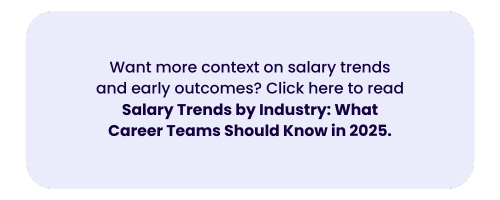Undergrad Negotiation Confidence: The Hidden Equity Opportunity




Many undergrad students accept the first salary they’re offered without asking for more. This decision shapes more than just that first paycheck. It affects every raise, promotion, and new offer they’ll negotiate later. For students who already see early pay gaps, the cost grows over time.
Early reporting shows that only about 38% of undergrad students negotiate their first offer. For the students who do, the increase is real. Even a modest bump sets a higher baseline for future earnings. Over a few years, that difference adds up to tens of thousands of dollars.
Where Confidence Breaks Down
Students hesitate to negotiate for many reasons. Some worry the offer will be rescinded. Others feel uncomfortable talking about money. Many simply do not know what is normal in their field.
This is especially true for first-generation students and students who lack professional networks. Without examples to follow, asking for more can feel risky.
The Bigger Equity Risk
The students least likely to negotiate are often those who already see lower starting salaries. Missing out on that first salary bump can widen the gap further. When career teams normalize negotiation and share clear salary data, students are more likely to advocate for themselves.
A small increase in the first offer shapes what they earn for years. A confident, informed student carries that skill into every new job or promotion.

What Career Teams Can Do
Negotiation shouldn’t be a last-minute topic saved for a single appointment. The best career teams weave it into student programming early and make it feel practical.
Here are a few ways to strengthen your support:
Negotiation confidence is more than just a one-time skill. For many students, it shapes whether they start on equal footing or carry a gap forward for years. By making it part of the bigger career story, you help students advocate for what their work is worth.
See salary ranges, hiring timelines, and negotiation trends by industry.
*These insights reflect early reporting as of May 1, 2025. Actual final outcomes may shift as additional data is collected and verified throughout the year.
See how Career Cloud helps you stay ahead of trends and support every student’s success.